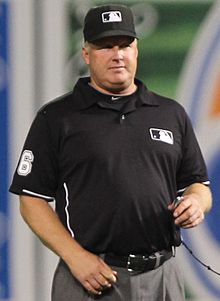It's been weird lately; several of my most recent posts have to some degree involved officiating. I felt compelled after catching a bit of SportsCenter last night to have a little something more specifically tied to the issue.
I've mentioned more than once here that I'm a firm believer that the officiating is not the main reason why one team loses a game to another, and that you can always tie the result back to something that happened during the course of play that determined the winner and loser. On rare occasions there are exceptions to this rule, and while this particular instance might be one, it's hard to say.
I didn't watch any of this Toronto-Tampa game, but I saw this highlight last night after the fact and was intrigued by what happened.
On the whole, I tend to like the umpires in Major League Baseball (contrary to what a lot of people say). It's a hard job, and more often than not they make the correct calls. I would dare to say an overwhelming majority of the calls they make are correct. It's when they're wrong and it leads to something big happening for one side or the other that blood boils.
For this play? When I first watched the replays I immediately though both the 3-1 and 3-2 pitches were not in the strike zone. I don't mind Lawrie running towards first base. If anything, I liken it to a catcher trying to bring the ball back over the strike zone on a borderline pitch in that you're trying to sell the call (which you'll notice, Tampa's catcher did on the 3-2 pitch). Some of the theories have been that when Lawrie ran towards first it aggravated Bill Miller (the home plate umpire) to the point where he wanted to remind the youngster of his place and call a strike on anything borderline. While I understand you want to keep the rookies from getting big-headed, this is absolutely not the way to go about it. I've also heard arguments that the strike zone was tilted that way all game for both sides. I didn't see the game so I don't know for sure either way, but if it were consistently called like that I have my doubts that Lawrie would have reacted the way he did.
Everything that came after the bad call however was handled appropriately and correctly. Lawrie tried to argue balls and strikes, which is an automatic ejection. Same for the manager in trying to protect his player. The fun aspect thrown (pun not intended) into all of this was Lawrie tossing his helmet on the ground and seeing it ricochet into Miller. By rule, Lawrie will get suspended, and rightfully so. When deciding his punishment they need to remember that he didn't throw it at Miller, but at the ground. At the same time they also need to let Lawrie know not to lose his cool. The 4 games he got should suffice.
On top of all this, Miller needs to see some discipline as well. This isn't like Jim Joyce a couple years ago who missed a call, realized his mistake later and apologized. I don't think this was a call that decided the game, but he made himself appear to be bigger than the game of baseball by taking it upon himself to teach Lawrie a lesson. Then again maybe he honestly thought it was a strike. If he did, I'm not sure what his rationale was.
In the flow of the game, had the correct call been made, Lawrie gets first base with one out. If the rest of the games goes as it did, it's possible that ground ball ends the game with a double play, but it's hard to say. Approaches at the plate can differ between none on/two outs and one on/one out. We will never know for sure.
Umpires are human too. Like the ballplayers, the men in blue can make mistakes. When they don't, no one notices them. When they do, there's an uproar. I think the uproar here is justified, but Lawrie is at fault too. He broke the rule of not arguing balls and strikes, and he paid for it, as he'll pay for the helmet incident. But Miller should also pay for drawing attention to himself... intentionally or otherwise. Both are guilty.



No comments:
Post a Comment